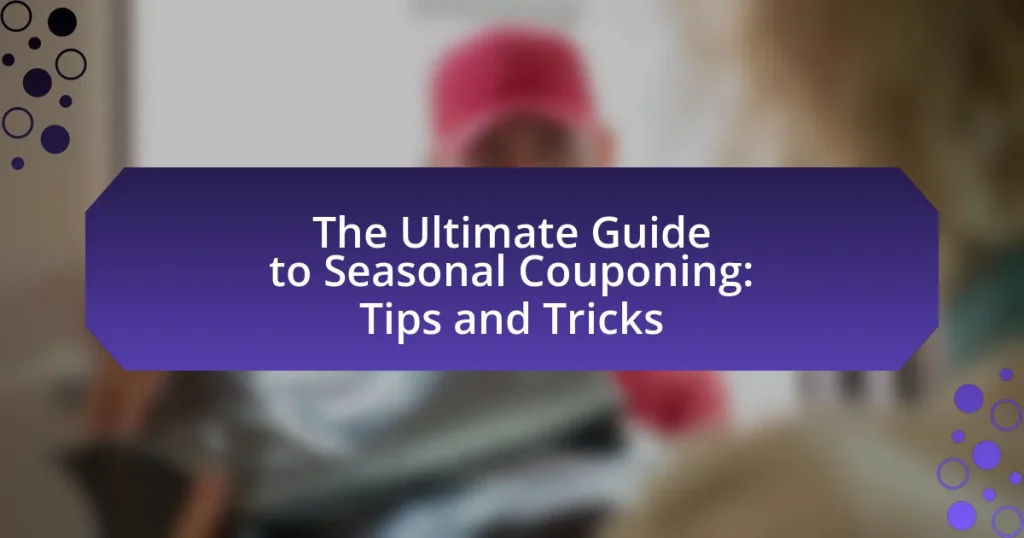Local Seasonal Deals are promotional offers provided by businesses within specific geographic areas during particular seasons or holidays, aimed at attracting customers through discounts that reflect local culture and consumer behavior. These deals differ from regular promotions by being time-sensitive and tailored to seasonal events, significantly influencing consumer spending and local business revenue. Factors such as local demand, seasonal trends, and retailer participation play crucial roles in the availability of these deals. Consumers can expect savings ranging from 20% to 50% and can find these deals through various sources, including local newspapers, online platforms, and community events. The article explores the importance of Local Seasonal Deals for consumers and businesses, strategies for maximizing savings, and best practices for finding and utilizing these promotions effectively.

What are Local Seasonal Deals?
Local Seasonal Deals are promotional offers or discounts provided by businesses in a specific geographic area during particular seasons or holidays. These deals are designed to attract customers by capitalizing on seasonal trends, such as summer sales, back-to-school promotions, or holiday discounts. For example, a study by the National Retail Federation indicates that seasonal promotions can increase consumer spending significantly during peak shopping periods, demonstrating the effectiveness of local seasonal deals in driving sales and enhancing customer engagement.
How do Local Seasonal Deals differ from regular deals?
Local Seasonal Deals differ from regular deals primarily in their time-sensitive nature and geographic focus. Local Seasonal Deals are specifically tailored to coincide with seasonal events or holidays within a particular area, offering promotions that reflect local culture and consumer behavior during those times. In contrast, regular deals may not be tied to specific seasons or locations and can be more generic, appealing to a broader audience without the localized context. For example, a Local Seasonal Deal might provide discounts on summer activities or holiday-themed products that are relevant to the community, while regular deals could encompass a wide range of products available year-round without seasonal relevance.
What factors influence the availability of Local Seasonal Deals?
The availability of Local Seasonal Deals is influenced by several key factors, including local demand, seasonal trends, and retailer participation. Local demand refers to the specific needs and preferences of consumers in a given area, which can drive retailers to offer deals that cater to those preferences. Seasonal trends, such as holidays or local events, create opportunities for retailers to promote relevant products at discounted prices. Retailer participation is crucial, as businesses must be willing to create and advertise these deals to attract customers. For instance, during the back-to-school season, retailers often provide discounts on school supplies, reflecting both seasonal trends and local demand.
How do seasonal trends affect Local Seasonal Deals?
Seasonal trends significantly influence Local Seasonal Deals by aligning promotions with consumer behavior and demand fluctuations throughout the year. For instance, during holidays like Christmas or summer vacations, businesses often offer targeted discounts to attract customers, resulting in increased sales. According to a study by the National Retail Federation, holiday sales can account for up to 30% of a retailer’s annual revenue, demonstrating the impact of seasonal trends on local deals. Additionally, local businesses may adjust their offerings based on seasonal events, such as back-to-school sales or summer clearance events, further enhancing the relevance and effectiveness of their promotions.
Why are Local Seasonal Deals important for consumers?
Local Seasonal Deals are important for consumers because they provide significant savings on products and services that are relevant to specific times of the year. These deals often align with seasonal events, holidays, or local festivals, allowing consumers to take advantage of discounts that enhance their shopping experience. For instance, a study by the National Retail Federation found that consumers planned to spend an average of $998 on holiday-related purchases in 2021, highlighting the financial impact of seasonal shopping. By utilizing local seasonal deals, consumers can maximize their budgets while enjoying products that cater to their immediate needs and preferences.
What savings can consumers expect from Local Seasonal Deals?
Consumers can expect savings ranging from 20% to 50% when utilizing Local Seasonal Deals. These deals often include discounts on seasonal products, services, and local events, making them an attractive option for budget-conscious shoppers. For instance, a study by the National Retail Federation found that consumers saved an average of 30% during seasonal sales events, highlighting the effectiveness of local promotions in reducing overall spending.
How do Local Seasonal Deals support local businesses?
Local Seasonal Deals support local businesses by driving customer traffic during specific times of the year, such as holidays or seasonal events. These deals create a sense of urgency and encourage consumers to shop locally, which can lead to increased sales and revenue for small businesses. For instance, a study by the American Express OPEN Small Business Saturday Consumer Insights found that 67% of consumers reported shopping at small businesses during the holiday season, highlighting the effectiveness of seasonal promotions in boosting local economies.

Where can you find Local Seasonal Deals?
Local seasonal deals can be found at various sources including local newspapers, community bulletin boards, and online platforms such as Groupon or RetailMeNot. These sources often feature promotions and discounts specific to your area, especially during seasonal events or holidays. For example, local newspapers frequently publish coupon inserts that highlight seasonal sales from nearby retailers, while community bulletin boards may showcase deals from local businesses. Online platforms aggregate deals from multiple retailers, making it easy to find seasonal offers tailored to your location.
What online platforms offer Local Seasonal Deals?
Online platforms that offer Local Seasonal Deals include Groupon, LivingSocial, and RetailMeNot. These platforms provide users with access to discounts and promotions specific to their geographic location, allowing consumers to find deals on local services, restaurants, and events. For instance, Groupon features a wide range of offers that vary by city, while LivingSocial focuses on experiences and activities in local markets. RetailMeNot aggregates coupons and deals from various retailers, including those that are seasonally relevant.
How can social media be used to discover Local Seasonal Deals?
Social media can be used to discover local seasonal deals by following local businesses, joining community groups, and utilizing location-based hashtags. Many businesses post exclusive promotions and discounts on their social media pages, especially during seasonal events. For instance, platforms like Facebook and Instagram allow users to search for local businesses and view their posts, which often include time-sensitive deals. Additionally, community groups on these platforms frequently share information about local sales and promotions, making it easier for users to find relevant offers. According to a 2021 survey by Sprout Social, 54% of consumers use social media to research products, indicating that social media is a valuable tool for discovering local deals.
What role do coupon websites play in finding Local Seasonal Deals?
Coupon websites serve as essential platforms for discovering local seasonal deals by aggregating discounts and promotions from various businesses in specific geographic areas. These websites allow users to search for deals based on their location, making it easier to find relevant offers that align with seasonal events or holidays. For instance, during the holiday season, coupon websites often feature promotions from local retailers, restaurants, and service providers, enabling consumers to save money while supporting their community. The effectiveness of coupon websites in this context is evidenced by their ability to drive foot traffic to local businesses, as studies show that 80% of consumers are more likely to shop at a store that offers coupons or discounts.
What offline methods can help in finding Local Seasonal Deals?
To find local seasonal deals offline, individuals can utilize methods such as visiting local markets, checking community bulletin boards, and engaging with local businesses directly. Local markets often feature seasonal promotions and discounts that are not advertised online. Community bulletin boards, typically found in libraries or community centers, frequently display flyers and announcements for local sales and events. Additionally, directly visiting or calling local businesses can yield information about exclusive in-store promotions or seasonal sales that may not be widely advertised. These methods are effective as they tap into community resources and direct interactions, which often reveal deals that are not available through digital channels.
How can local newspapers and flyers be useful for Local Seasonal Deals?
Local newspapers and flyers are effective tools for promoting local seasonal deals by providing targeted advertising to community members. These publications often feature special promotions, discounts, and coupons that are specifically tailored to local businesses, making it easier for consumers to find relevant deals in their area. For instance, a study by the Newspaper Association of America found that 73% of consumers read local newspapers, indicating a strong engagement with this medium. Additionally, flyers distributed in neighborhoods can directly reach potential customers, increasing the likelihood of participation in seasonal promotions.
What community events might feature Local Seasonal Deals?
Community events that might feature Local Seasonal Deals include farmers’ markets, holiday festivals, and community fairs. Farmers’ markets often showcase local produce and products, providing vendors with opportunities to offer seasonal discounts. Holiday festivals typically include local businesses promoting special deals to attract shoppers during peak seasons. Community fairs frequently feature local artisans and businesses that may provide coupons or discounts to encourage community engagement and support. These events create a platform for local businesses to connect with consumers while promoting seasonal offerings.

How can you maximize your savings with Local Seasonal Deals?
To maximize your savings with Local Seasonal Deals, actively seek out and utilize coupons and promotions specific to your area during peak seasonal sales. Local businesses often offer significant discounts to attract customers during holidays or seasonal events, which can lead to savings of 20% to 50% off regular prices. For example, a study by the National Retail Federation found that consumers can save an average of $200 annually by using local coupons. By subscribing to local newsletters, following businesses on social media, and using coupon apps, you can stay informed about these deals and strategically plan your purchases to take full advantage of the savings available.
What strategies can you use to effectively use Local Seasonal Deals?
To effectively use Local Seasonal Deals, businesses should implement targeted marketing strategies that align with seasonal trends and local consumer behavior. This includes analyzing local demographics to tailor promotions that resonate with the community, utilizing social media platforms to reach potential customers with timely offers, and collaborating with local influencers to enhance visibility. For instance, a study by the National Retail Federation indicates that 75% of consumers are influenced by local deals during seasonal events, highlighting the importance of localized marketing efforts. Additionally, businesses can leverage email marketing campaigns to inform subscribers about exclusive seasonal deals, ensuring that the promotions reach an engaged audience.
How can you combine Local Seasonal Deals with other promotions?
You can combine Local Seasonal Deals with other promotions by strategically layering discounts to maximize customer savings. For instance, a business can offer a local seasonal deal, such as a 20% discount on summer products, and simultaneously provide an additional promotion, like a buy-one-get-one-free offer on select items. This approach not only enhances the perceived value for customers but also encourages higher sales volume. Research indicates that layered promotions can increase customer engagement and drive foot traffic, as consumers are more likely to take advantage of multiple savings opportunities.
What tips can help you stay organized while tracking Local Seasonal Deals?
To stay organized while tracking local seasonal deals, create a dedicated spreadsheet or digital document to log all relevant information. This method allows for easy categorization of deals by store, expiration dates, and types of products, ensuring that you can quickly reference and update your findings. Additionally, setting reminders for deal expiration dates can prevent missed opportunities, as studies show that timely alerts improve coupon redemption rates by up to 30%. Regularly reviewing and updating your list will help maintain accuracy and relevance, making it easier to capitalize on seasonal promotions.
What are common pitfalls to avoid when using Local Seasonal Deals?
Common pitfalls to avoid when using Local Seasonal Deals include failing to verify the expiration dates of the deals, which can lead to missed savings. Additionally, not researching the participating businesses can result in poor quality or service, diminishing the value of the deal. Ignoring the terms and conditions associated with the deals may lead to unexpected restrictions or limitations on usage. Lastly, overlooking the timing of seasonal deals can cause consumers to miss out on the best offers, as many deals are time-sensitive and tied to specific events or holidays.
How can you ensure that a Local Seasonal Deal is legitimate?
To ensure that a Local Seasonal Deal is legitimate, verify the deal through official sources such as the business’s website or verified social media accounts. Cross-check the deal with customer reviews and ratings on platforms like Yelp or Google Reviews, as these can provide insights into the authenticity of the offer. Additionally, look for clear terms and conditions associated with the deal, as legitimate offers typically include specific details about usage, expiration dates, and any restrictions.
What should you watch out for in terms of expiration dates and restrictions?
When dealing with local seasonal deals and coupons, it is crucial to watch out for expiration dates and restrictions that may limit their use. Expiration dates indicate the last day a coupon can be redeemed, and using a coupon after this date will result in it being invalid. Additionally, restrictions may include limitations on specific products, minimum purchase requirements, or geographic limitations that dictate where the coupon can be used. For example, a coupon may only be valid for certain brands or items, or it may only apply at select retailers. Understanding these factors ensures that consumers maximize their savings and avoid disappointment at checkout.
What are the best practices for finding and using Local Seasonal Deals?
The best practices for finding and using local seasonal deals include utilizing online platforms, subscribing to local newsletters, and engaging with community social media groups. Online platforms such as Groupon and RetailMeNot aggregate seasonal deals from various local businesses, making it easy to compare offers. Subscribing to local newsletters ensures that you receive timely updates on promotions and exclusive discounts directly from businesses. Additionally, community social media groups often share limited-time offers and coupons, providing real-time information on local deals. These methods are effective because they leverage technology and community engagement to maximize savings opportunities.



